| Srl | Item |
| 1 |
ID:
139989


|
|
|
|
|
| Summary/Abstract |
Australia, Japan and the USA are all facing dual pressures that require them to do more with less. Internationally, they deal with the challenge of managing China’s rapid rise. However, domestically, they must cut government spending and reduce government debt. With internal balancing effectively ruled out as a long-term solution, the three states are seeking ways to optimise external balancing, or cooperation with like-minded states. This article focuses on Australian motivations regarding the recent proposal for submarine cooperation with Japan, and places it in the context of longer trends that poise the USA, Australia and Japan for even greater trilateralism in the future. Australia’s proposal to buy submarines from Japan, should it go through, would cement Australia and Japan’s fledgling security relationship in steel and coin. For Australia, it would help it to overcome its undersea capability gap, and Japan could set a precedent to re-enter the global weapons market if all goes well. Furthermore, Australia can use defence-technology cooperation with Japan to signal to the USA the seriousness of its commitment to burden-share in pursuit of regional security and determination to politically support the USA’s ‘Pivot’ to the Asia-Pacific. However, domestic politics have begun to play an important role in Australia, with a ‘spill’ motion against Prime Minister Tony Abbott barely overcome by a backroom deal with the opposition to build the submarines domestically, and this is an important development to keep an eye on.
|
|
|
|
|
|
|
|
|
|
|
|
|
|
|
|
| 2 |
ID:
140319
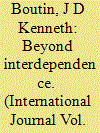

|
|
|
|
|
| Summary/Abstract |
China’s economic and politico-military development is placing considerable strain on the established framework of the trilateral relationship between itself, the United States, and Australia. Specifically, China’s rise is generating security concerns that are politicizing economic relations between the three states. A more guarded approach to economic collaboration will transform trilateralism, which up to now has been characterized by the scope allowed for the discrete pursuit of security and economic relations. This will force political authorities to carefully consider their policy priorities and further strain relations between the states, as well as supporting a more cautious approach to China on the part of the United States and Australia.
|
|
|
|
|
|
|
|
|
|
|
|
|
|
|
|
| 3 |
ID:
130163
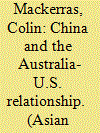

|
|
|
|
|
| Publication |
2014.
|
| Summary/Abstract |
This paper analyzes China's impact on Australia-U.S. relations from 1949 to 1996, including how far Australia's China policy followed the American lead. The conclusion: American influence was dominant, but Australia's own initiative was enough to belie the suggestion that it was no more than a blind follower.
|
|
|
|
|
|
|
|
|
|
|
|
|
|
|
|
| 4 |
ID:
103429
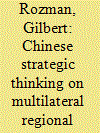

|
|
|
|
|
| Publication |
2011.
|
| Summary/Abstract |
This article argues that multilateral mechanisms for addressing security issues in East Asia are weak and that a key reason is the hollowness of China's ostensible and much-touted commitment to multilateralism. This is especially troubling when the region faces major security challenges and regional relations (and China's approach to them) appear to be moving from "economics in command" to "security in command." The article concludes with a prediction that "A coordinated approach to combining alliances and quasi-alliances exclusive of China with multilateralism inclusive of it will best test China's intentions during this decade."
|
|
|
|
|
|
|
|
|
|
|
|
|
|
|
|
| 5 |
ID:
072420
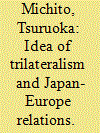

|
|
|
| 6 |
ID:
165154
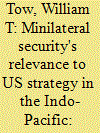

|
|
|
|
|
| Summary/Abstract |
The Indo-Pacific region's security landscape is unfolding in highly uncertain and potentially explosive ways. The postwar American-led network of bilateral alliances – underpinned by concrete guarantees of extended deterrence and containment – is now yielding to a more diverse set of alignments and coalitions to manage an increasingly complex array of regional security issues. Multilateralism and minilateralism have emerged as two increasingly prominent forms of such cooperation. Minilateralism's informality and flexibility appeals to those who are sceptical about multilateralism's traditional focus on norm adherence and community-building even as great power competition in the Indo-Pacific is sharply intensifying. However, minilateralism's track record in the region is underdeveloped. The potential for this policy approach to be applied by the United States and its regional security partners as an enduring and credible means of diplomatic and security collaboration in the region will remain unfulfilled as long as the Trump administration's own geopolitical orientation remains uncertain.
|
|
|
|
|
|
|
|
|
|
|
|
|
|
|
|